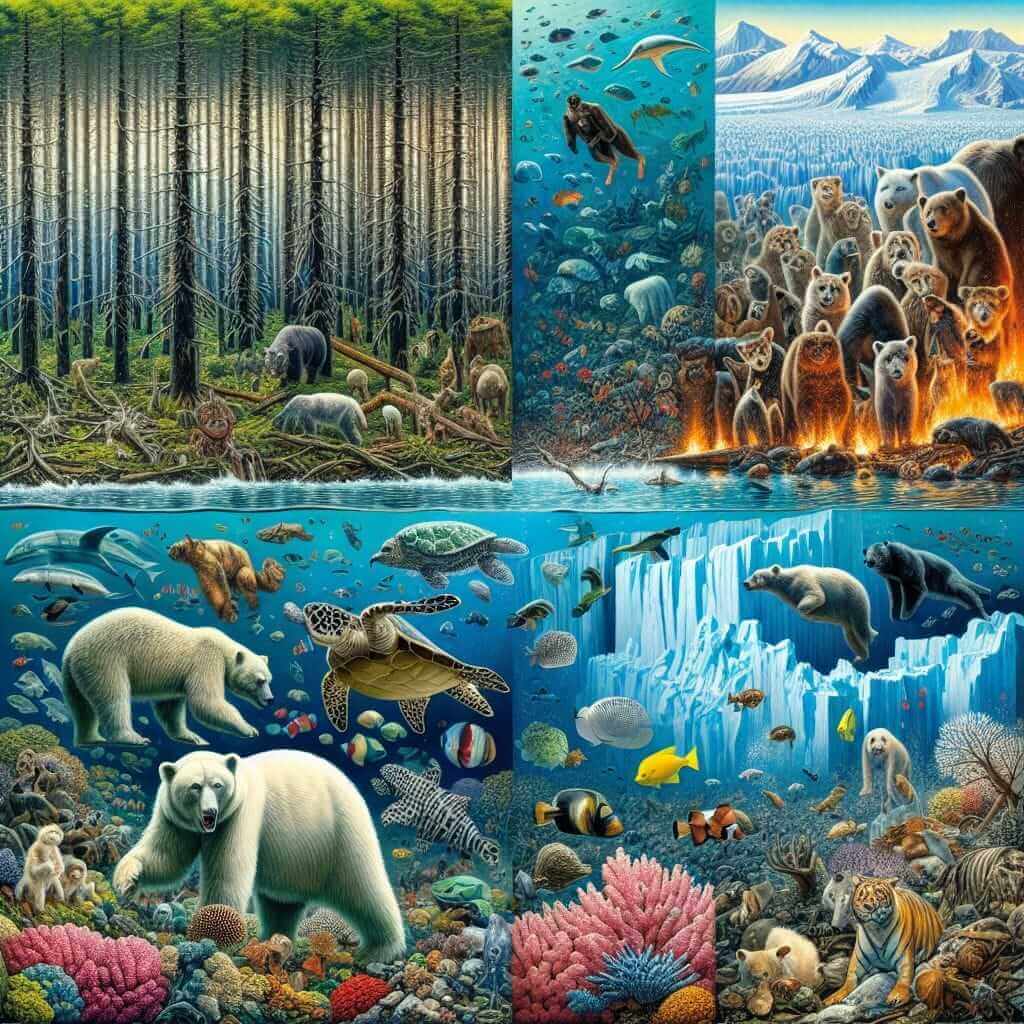The Reading section of the IELTS exam often tackles contemporary issues such as climate change and its impact on global biodiversity. This topic harnesses a wealth of vocabulary, grammar, and comprehension skills, making it a common subject in the exam. Given the urgency and relevance of climate change, it is likely that such a subject may appear in future IELTS tests. This article aims to provide a comprehensive IELTS reading practice based on the given topic: “How is climate change affecting global biodiversity?”
Reading Practice: How is Climate Change Affecting Global Biodiversity?
Passage
Climate change is heralded as one of the most pressing environmental challenges affecting biodiversity worldwide. The Earth’s climate is undergoing significant transformations due to anthropogenic activities. Increased global temperatures, rising sea levels, and altered weather patterns are all consequences of these activities, and they subsequently pose substantial threats to a myriad of species.
Species across various biomes are experiencing a shift in their habitats and ecosystems. For instance, coral reefs, which are extraordinarily sensitive to temperature changes, face severe bleaching events that lead to mass die-offs. Similarly, polar species such as polar bears are confronted with dwindling ice habitats, forcing them to traverse greater distances for food.

Moreover, climate-induced changes are causing phenological shifts — the timing of natural events. Migration patterns of birds, breeding cycles of amphibians, and flowering times of plants are all being altered. Such shifts create a dissonance between species interactions, leading to potential mismatches between predator and prey, or pollinators and their plants. This increases the risk of population declines and possible extinctions.
Additionally, climate change exacerbates the spread of invasive species and diseases. Warmer temperatures allow species that were previously constrained to equatorial regions to move poleward, threatening local species unadapted to these new competitors. Furthermore, pests and pathogens find more conducive conditions, leading to heightened outbreaks that decimate native populations.
In conclusion, the pervasive impacts of climate change on global biodiversity are profound. The changing climate influences species’ habitats, behaviors, and interactions, leading to cascading effects throughout ecosystems. Immediate and concerted efforts are imperative to mitigate these impacts and preserve biodiversity for future generations.
Questions
-
Multiple Choice
What is the primary cause of climate change as mentioned in the passage?
A. Natural processes
B. Anthropogenic activities
C. Solar radiation changes
D. Volcanic activities -
True/False/Not Given
Researchers have found that all species can adapt to the changes brought by climate change. -
Identifying Information (Yes/No/Not Given)
The passage suggests that the spread of invasive species is an indirect consequence of climate change. -
Matching Headings
Match the following headings with the corresponding paragraphs:
A. Phenological Shifts
B. Habitat Degradation
C. Invasive Species Spread
D. Polar and Coral Species Challenges -
Summary Completion
Complete the summary using words from the passage.
Climate change affects biodiversity in various ways. [1] across different biomes are experiencing habitat shifts. Coral reefs face [2] events, while polar species lose [3] habitats. Phenological shifts alter the [4] of natural events, leading to mismatches. Furthermore, the spread of [5] species and diseases poses additional threats.
Answers
-
B. Anthropogenic activities
Explanation: The passage clearly states that climate change is due to human activities. -
False
Explanation: The passage mentions that many species face challenges that can lead to population declines or extinction, indicating not all can adapt. -
Yes
Explanation: The passage discusses how climate change allows invasive species to spread, affecting local species. -
- Paragraph 1: B. Habitat Degradation
- Paragraph 2: D. Polar and Coral Species Challenges
- Paragraph 3: A. Phenological Shifts
- Paragraph 4: C. Invasive Species Spread
-
- Species
- Bleaching
- Ice
- Timing
- Invasive
Common Errors
Students often struggle with questions that involve identifying information. Be sure to read the entire passage carefully and focus on understanding the main idea of each paragraph. Misidentifying the key points can lead to incorrect answers.
Vocabulary
- Anthropogenic /ˌæn.θrə.pəˈdʒen.ɪk/ (adj): Resulting from the influence of human beings on nature.
- Phenological /ˌfiː.nəˈlɑː.dʒɪ.kəl/ (adj): Concerning the timing of seasonal biological events.
- Dissonance /ˈdɪs.ə.nəns/ (noun): A lack of agreement or harmony.
Grammar
-
Present Perfect Tense: Used to describe actions that have taken place at some point in the past and are relevant to the present.
- Example: “Researchers have found that migration patterns are changing.”
-
Passive Voice: Used to emphasize the action itself rather than the subject performing the action.
- Example: “Coral reefs face severe bleaching events.”
Tips for Achieving a High Reading Score
- Practice Regularly: Consistency is key. Practice reading different types of texts every day.
- Expand Your Vocabulary: Familiarize yourself with IELTS-specific vocabulary related to common topics.
- Skim and Scan: Use skimming to get the gist and scanning to locate specific information.
- Practice Different Question Types: Be comfortable with multiple choice, true/false/not given, and matching headings questions.
- Time Management: Allocate your time wisely and don’t spend too long on a single question.
By following these strategies and consistently practicing with high-quality reading materials, you can improve your reading skills and achieve a higher score on your IELTS exam.